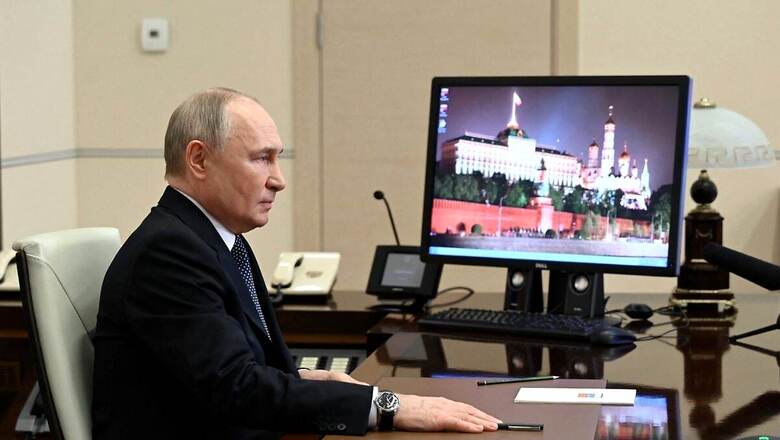
views
Russian President Vladimir Putin has refused to directly blame the Islamic State for the Moscow concert hall terror attack despite a claim by the extremist group and has implied that the attackers had links to Ukraine.
It should, however, be noted that Putin has acknowledged that radical Islamists were behind the attacks.
“We know that the crime was carried out by the hand of radical Islamists with an ideology that the Muslim world has fought for centuries,” Putin said in remarks posted on the Telegram messaging app but he does not directly mention Islamic State.
IS claimed the attack Friday evening on the Crocus City Hall concert venue on the outskirts of Moscow that left at least 137 people dead. France and the US also said that they have reasons to believe, based on intel inputs they received, that the Islamic State is behind the attacks.
The US also said that it warned Russia of an attack that would target mass gatherings earlier under its ‘duty to warn’ policy.
Russian authorities detained 11 people in connection with Friday’s attack and four of the suspects — with bruises and cuts on their swollen faces — were dragged into the capital’s Basmanny district court before dozens of reporters.
The court identified them as Muhammadsobir Fayzov, Shamsidin Fariduni, Rachabalizoda Saidakrami and Dalerjon Mirzoyev. Russian state media said they were all citizens of Tajikistan. Two of them pleaded guilty, the court said.
Meanwhile, Turkey said that two out of the detained 11 – Rachabalizoda Saidakrami and Shamsidin Fariduni – travelled “freely” to Russia as no arrest warrants were issued against them and claimed they were radicalised in Russia, according to the AFP, raising concerns for Putin as well as FSB as questions arise regarding the scope of the security lapse by Russian authorities.
Too Much Focus On Ukraine, Dissidents
Former US intelligence officials and Western security analysts pointed out that the principal security agency of Russia, FSB, has its hands full. They have to hunt down Ukrainian saboteurs inside Russia, keep dissidents silent, disrupt operations of hostile foreign intelligence agencies while also checking for rising terror threats.
“You can’t do everything. You dial up the pressure on the locals and sometimes you don’t get the intelligence you need on a potential terrorist attack. That’s where they failed. It’s possible they’re overextended dealing with the war in Ukraine and dealing with political opposition. This one slipped through the cracks,” Daniel Hoffman, a former senior CIA operations officer who served as the agency’s Moscow station chief, was quoted as saying by Reuters.
An admission of slip-up by the successor agency to the Soviet Union’s KGB could hurt Putin’s credibility as he began his fifth presidential term after his reelection.
It also can be seen as a tactic to escalate the so-called ‘military operation’ in Ukraine as Putin sees that the Russian Army has the upper hand on the battlefield over two years into the war.
The FSB has said Friday’s concert hall attack was “painstakingly” planned and that the gunmen had carefully hidden their weapons.
But despite the FSB’s statement, questions also arise regarding the previous claims that the Russian government has tackled the threat from jihadists. It also poses tough questions for the Kremlin regarding its so-called ‘sphere of influence’ as the terrorists were from Tajikistan.
Tajikistan’s strongman leader Emomali Rahmon and Vladimir Putin share a close relationship and an AFP report said that around one million Tajiks travel to Russia every year, and the number is growing.
2,300 Tajiks have joined IS since 2015, including the high-profile case of a former Tajik police commander who defected to IS.
“Over the past three years, 24 of our citizens have committed terrorist acts in 10 countries. The number of young people who have joined terrorist organisations, including IS, has increased,” Tajik President Emomali Rahmon said.
The FSB and Kremlin could also be accused of not paying adequate attention to who is entering the nation, as evidenced by Turkey’s claims, which contributed to the slip-up, putting Putin, who once headed the FSB, in a tough spot.
Russian citizens were also quick to point out that the security as the Crocus City Hall was less compared to the police presence at memorials planned to commemorate the life of Putin-critic Alexei Navalny who died in a Russian penal colony under mysterious circumstances.
Russia has fought Islamist radicals earlier as well. Putin in his first term began his presidential tenure by fighting a long, bloody fight in southern Russia’s Dagestan and Chechnya provinces against radical Islamists but since these elements were suppressed, Russian authorities may have led to believe that jihadists did not pose much of a threat.
But many Russian commentators were in no doubt where to lay the blame.
“We are not talking about ISIS here. It was the khokhly,” said the editor-in-chief of the RT channel Margarita Simonyan, using a term used pejoratively in Russia to denote Ukrainians.
Mass-circulation newspaper Komsomolskaya Pravda even quoted one commentator as blaming the “British special services and the Americans and Ukrainians” for the attack.



















Comments
0 comment